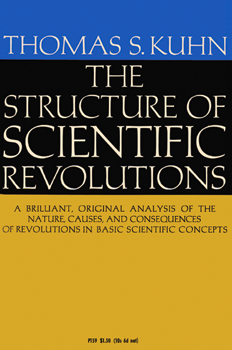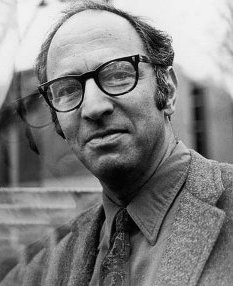
Errol Mark Morris is an American film director known for documentaries that interrogate the epistemology of their subjects, and the invention of the Interrotron. In 2003, his documentary film The Fog of War: Eleven Lessons from the Life of Robert S. McNamara won the Academy Award for Best Documentary Feature. His film The Thin Blue Line placed fifth on a Sight & Sound poll of the greatest documentaries ever made. Morris is known for making films about unusual subjects; Fast, Cheap & Out of Control interweaves the stories of an animal trainer, a topiary gardener, a robot scientist and a naked mole rat specialist.
Philosophy of science is the branch of philosophy concerned with the foundations, methods, and implications of science. Amongst its central questions are the difference between science and non-science, the reliability of scientific theories, and the ultimate purpose and meaning of science as a human endeavour. Philosophy of science focuses on metaphysical, epistemic and semantic aspects of scientific practice, and overlaps with metaphysics, ontology, logic, and epistemology, for example, when it explores the relationship between science and the concept of truth. Philosophy of science is both a theoretical and empirical discipline, relying on philosophical theorising as well as meta-studies of scientific practice. Ethical issues such as bioethics and scientific misconduct are often considered ethics or science studies rather than the philosophy of science.
Reality is the sum or aggregate of all that is real or existent within the universe, as opposed to that which is only imaginary, nonexistent or nonactual. The term is also used to refer to the ontological status of things, indicating their existence. In physical terms, reality is the totality of a system, known and unknown.
Relativism is a family of philosophical views which deny claims to objectivity within a particular domain and assert that valuations in that domain are relative to the perspective of an observer or the context in which they are assessed. There are many different forms of relativism, with a great deal of variation in scope and differing degrees of controversy among them. Moral relativism encompasses the differences in moral judgments among people and cultures. Epistemic relativism holds that there are no absolute principles regarding normative belief, justification, or rationality, and that there are only relative ones. Alethic relativism is the doctrine that there are no absolute truths, i.e., that truth is always relative to some particular frame of reference, such as a language or a culture. Some forms of relativism also bear a resemblance to philosophical skepticism. Descriptive relativism seeks to describe the differences among cultures and people without evaluation, while normative relativism evaluates the word truthfulness of views within a given framework.
Moral relativism or ethical relativism is used to describe several philosophical positions concerned with the differences in moral judgments across different peoples and cultures. An advocate of such ideas is often referred to as a relativist.
Analytic philosophy is a broad, contemporary movement or tradition within Western philosophy, especially anglophone philosophy, focused on analysis. Analytic philosophy is characterized by a clarity of prose; rigor in arguments; and making use of formal logic and mathematics, and, to a lesser degree, the natural sciences. It is further characterized by an interest in language and meaning known as the linguistic turn. It has developed several new branches of philosophy and logic, notably philosophy of language, philosophy of mathematics, philosophy of science, modern predicate logic and mathematical logic.
In philosophy of science and in epistemology, instrumentalism is a methodological view that ideas are useful instruments, and that the worth of an idea is based on how effective it is in explaining and predicting natural phenomena. According to instrumentalists, a successful scientific theory reveals nothing known either true or false about nature's unobservable objects, properties or processes. Scientific theory is merely a tool whereby humans predict observations in a particular domain of nature by formulating laws, which state or summarize regularities, while theories themselves do not reveal supposedly hidden aspects of nature that somehow explain these laws. Instrumentalism is a perspective originally introduced by Pierre Duhem in 1906.
Scientific realism is the view that the universe described by science is real regardless of how it may be interpreted. A believer of scientific realism takes the universe as described by science to be true, because of their assertion that science can be used to find the truth about both the physical and metaphysical in the Universe.

The Structure of Scientific Revolutions is a book about the history of science by the philosopher Thomas S. Kuhn. Its publication was a landmark event in the history, philosophy, and sociology of science. Kuhn challenged the then prevailing view of progress in science in which scientific progress was viewed as "development-by-accumulation" of accepted facts and theories. Kuhn argued for an episodic model in which periods of conceptual continuity where there is cumulative progress, which Kuhn referred to as periods of "normal science", were interrupted by periods of revolutionary science. The discovery of "anomalies" during revolutions in science leads to new paradigms. New paradigms then ask new questions of old data, move beyond the mere "puzzle-solving" of the previous paradigm, change the rules of the game and the "map" directing new research.

Constructivism is a view in the philosophy of science that maintains that scientific knowledge is constructed by the scientific community, which seeks to measure and construct models of the natural world. According to constructivists, natural science consists of mental constructs that aim to explain sensory experiences and measurements, and that there is no single valid methodology in science but rather a diversity of useful methods. They also hold that the world is independent of human minds, but knowledge of the world is always a human and social construction. Constructivism opposes the philosophy of objectivism, embracing the belief that human beings can come to know the truth about the natural world not mediated by scientific approximations with different degrees of validity and accuracy.
Ethical subjectivism is the meta-ethical view which claims that:
- Ethical sentences express propositions.
- Some such propositions are true.
- The truth or falsity of such propositions is ineliminably dependent on the attitudes of people.
Commensurability is a concept in the philosophy of science whereby scientific theories are said to be "commensurable" if scientists can discuss the theories using a shared nomenclature that allows direct comparison of them to determine which one is more valid or useful. On the other hand, theories are incommensurable if they are embedded in starkly contrasting conceptual frameworks whose languages do not overlap sufficiently to permit scientists to directly compare the theories or to cite empirical evidence favoring one theory over the other. Discussed by Ludwik Fleck in the 1930s, and popularized by Thomas Kuhn in the 1960s, the problem of incommensurability results in scientists talking past each other, as it were, while comparison of theories is muddled by confusions about terms, contexts and consequences.
Philosophical realism – usually not treated as a position of its own but as a stance towards other subject matters – is the view that a certain kind of thing has mind-independent existence, i.e. that it exists even in the absence of any mind perceiving it or that its existence is not just a mere appearance in the eye of the beholder. This includes a number of positions within epistemology and metaphysics which express that a given thing instead exists independently of knowledge, thought, or understanding. This can apply to items such as the physical world, the past and future, other minds, and the self, though may also apply less directly to things such as universals, mathematical truths, moral truths, and thought itself. However, realism may also include various positions which instead reject metaphysical treatments of reality entirely.
Neopragmatism, sometimes called post-Deweyan pragmatism, linguistic pragmatism, or analytic pragmatism, is the philosophical tradition that infers that the meaning of words is a result of how they are used, rather than the objects they represent.

In science, objectivity refers to attempts to do higher quality research by eliminating personal biases, emotions, and false beliefs, while focusing mainly on proven facts and evidence. It is often linked to observation as part of the scientific method. It is thus intimately related to the aim of testability and reproducibility. To be considered objective, the results of measurement must be communicated from person to person, and then demonstrated for third parties, as an advance in a collective understanding of the world. Such demonstrable knowledge has ordinarily conferred demonstrable powers of prediction or technology.

The Hedgehog, the Fox, and the Magister's Pox (2003) is Stephen Jay Gould's posthumous volume exploring the historically complex relationship between the sciences and the humanities in a scholarly discourse.

The Manacled Mormon case, also known as the Mormon sex in chains case, was a case of reputed sexual assault and kidnap by an American woman, Joyce McKinney, of a young American Mormon missionary, Kirk Anderson, in England in 1977. Because McKinney and her accomplice skipped bail and fled to the United States before the case could be tried and were not extradited, they were never tried for these specific crimes. According to Anderson, he had been abducted by McKinney from the steps of a church meetinghouse, chained to a bed and raped by her.

Thomas Samuel Kuhn was an American historian and philosopher of science whose 1962 book The Structure of Scientific Revolutions was influential in both academic and popular circles, introducing the term paradigm shift, which has since become an English-language idiom.
In the philosophy of science, observations are said to be "theory-laden" when they are affected by the theoretical presuppositions held by the investigator. The thesis of theory-ladenness is most strongly associated with the late 1950s and early 1960s work of Norwood Russell Hanson, Thomas Kuhn, and Paul Feyerabend, and was probably first put forth by Pierre Duhem about 50 years earlier.

Valley of the Shadow of Death is a photograph by Roger Fenton, taken on April 23, 1855, during the Crimean War. It is one of the most well-known images of war.








